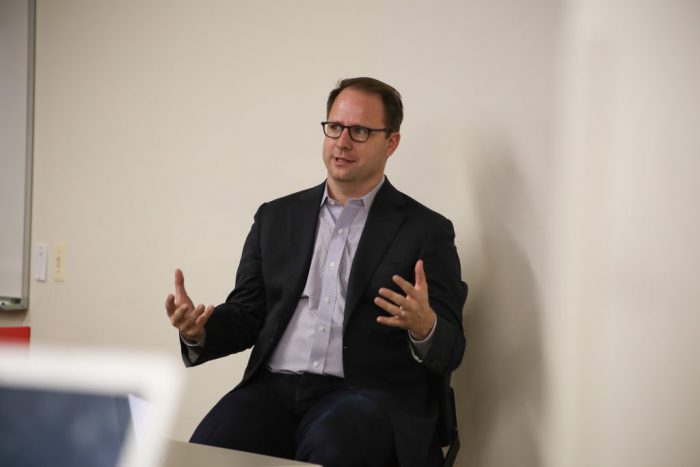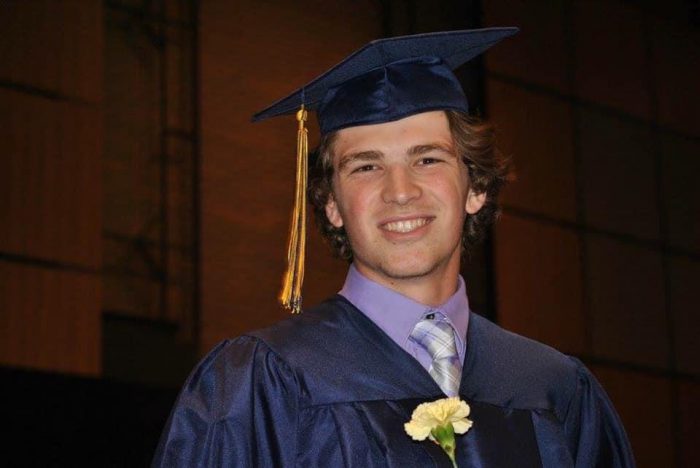Zoe Spilker • Nov. 8, 2017

With the rise of digital platforms, podcasts and more, having a relevant voice is becoming more difficult than before in the sports media industry. Bryan Curtis, editor-at-large of the sports and pop culture website and podcast network The Ringer, spoke to students in associate professor Galen Clavio’s Introduction to Sports Media class Monday about how to find their voices in the competitive sports media industry.
After being benched from his second-grade baseball team, Curtis realized baseball wasn’t his future. He decided to be a sports writer instead. His biggest influence was Sports Illustrated writer Dan Jenkins. Jenkins grew up in Fort Worth, Texas, like Curtis and had edited their high school newspaper at one point. Jenkins went on to write best-selling novels and appear on ESPN.
“Just having that, I was like, ‘Oh wow, I can become a sports writer. I can go be a national sports writer from this high school,’” Curtis said. “I didn’t think I could be a great American novelist. I didn’t think I could win a Nobel Prize in chemistry, because there was no example for that, but there was this guy. He did it. How hard could it be?”
Sophomore journalism major Becca Carney had a similar notion while listening to Curtis’ talk.
“I really like having people in the industry to talk to,” she said. “Getting a job like theirs seems more attainable when there are real people in front of you.”
The National Sports Journalism Center, which resides in The Media School, hosted Curtis’ visit. In addition to speaking in Introduction to Sports Media, Curtis also had a public meet-and-greet and a networking dinner with sports media students.
Curtis began his career writing about politics for The New Republic. He went on to become a columnist for Play: The New York Times Sports Magazine and ultimately found himself with The Ringer. Although he has written for many well-known publications, Curtis did not always have a specific voice he used in his writing. Finding his voice was a lot of taking bits of what he liked from other writers and morphing it into his own style.
“Style is something you develop,” he said. “Some people come out with it out of high school, some people right out of college. Some people, like me certainly, had to wait a couple years into my professional career to realize what I wanted to be.”
He urged students to develop an outlook on sports that is different from everybody else’s. Perhaps their voice is based on the way they grew up, or maybe they played a lot of sports, so they have an athlete’s perspective. Maybe they grew up in a family of Colts fans but were themselves a Patriots fan. Anything that will define their style.
The sports media world is no longer limited to radio, television and writing. Because there are so many career paths for aspiring sports journalists now, Curtis told students to find one thing they’re really good at. Having one thing you can do exceptionally well, no matter how niche, will stand out to employers and help score jobs and internships. Once new graduates get a position in a company, employers will know they can focus that enthusiasm into whatever job they place in front of them.
“Go to the biggest publication that will let you do the most stuff, because if the biggest won’t let you do anything, then that’s just not worth it,” Curtis said.
The first couple years of entry-level jobs are more about being reliable and hardworking than being brilliant, he said, but they will lay the groundwork for future positions.
Even now, Curtis spends a lot of time polishing his own work.
“I don’t look at something I do and say, ‘Oh, this is great,’” he said. “I’m going to keep doing what I’m already doing to do a better job of it.”
And maybe write a book or two along the way, he hopes.


